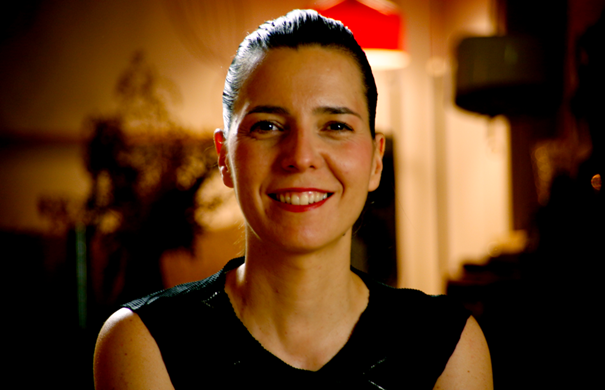Plenary Talk Information
January 22nd, 9:10-10:10
Title: Simple solutions (still) can make it: on soft robot design and control
Speaker: Prof. Concepción Alicia Monje Micharet, University Carlos III of Madrid, Spain.
This talk addresses the application of model-based robust fractional order control to real robotic systems manufactured from soft materials. First of all, simple soft robot designs are addressed, demonstrating their robust and precise performance despite the softness of their bodies. Second, instead of using rigorous models to describe the complex dynamics of these soft robots, the neglected dynamics and possible parameter mismatches are handled by a fractional order control approach. Based on fractional calculus, which implies the generalization of the derivative and integral operators to those of non-integer (fractional) order, fractional order controllers allow the implementation of robust control schemes with a straightforward mathematical definition. These controllers provide a robust performance of the robots due to their superior flexibility, often outperforming their integer counterparts.
Biography:
Prof. C.A. Monje is Full Professor at the University Carlos III of Madrid (UC3M). She has been working in robotics and control for over 20 years. Her work on soft robotics and systems control is internationally recognized. She has actively collaborated with research centers in the United States, France, Germany, Italy, and Singapore. As the Principal Investigator (PI) of the Soft Robotics Laboratory of the UC3M RoboticsLab, with a strong expertise in soft robots prototyping, modelling and control (both model-based and Artificial Intelligence (AI) techniques), she has been involved as PI and researcher in numerous European, national and regional competitive projects, transferring her knowledge through company contracts and patents. She has published more than 200 research papers in high impact journals and conferences on control, robotics and AI, with 7000+ cites. Some of her awards and recognitions are: “TALGO Excelencia Profesional de la Mujer en Ingeniería” Award (finalist) (2022, 2023, 2024), “Top 100 Mujeres Líderes en España, Categoría Investigadoras” Award (2020), “Gigante Extremeño” Award (2019); “Ada Byron a la Mujer Tecnóloga de la Universidad de Deusto” Award (2019); “Excelencia Investigadora de la Universidad Carlos III de Madrid” Award (2018); “Mujer y Tecnología de la Fundación Orange” Award (2018).
January 23rd, 11:00-12:00
Title: The Evolution of Robotics Hardware Design through AI Advancements
Speaker: Prof. Shigeki Sugano, Waseda University, Japan.
Abstract:
This presentation explores how advancements in artificial intelligence are transforming the design of robotics hardware. AI enables robots to autonomously generate and optimize movements, which can significantly enhance performance. However, the effectiveness of these capabilities is highly dependent on the underlying hardware design. This talk will delve into the critical relationship between AI systems and hardware architecture in robotics, discussing the optimal approaches for system integration. Attendees will gain insights into the latest trends in AI-driven design and discover best practices for developing hardware that fully leverages AI’s potential.
Biography:
January 24th, 11:00-12:00
Title: Adaptive Robotic Systems in Unknown and Uncertain Environments
Speaker: Prof. Jing Xiao, Worcester Polytechnic Institute, USA.
Abstract:
To enable robots to operate in unknown and uncertain environments requires not only research of important capabilities such as perception, reasoning, planning, learning, control, and actuation, but tight system integration of the respective hardware and software components to perform in real time. In this talk, I will focus on major software challenges and our general, adaptive solutions for robotic systems on autonomous exploration and visual coverage of unknown environments based on onboard sensing, highlighting the importance of system integration. I’ll also briefly introduce system integration in autonomous search of semantic objects in unknown environments and autonomous manipulation of unknown objects.
Biography:
Jing Xiao is the Deans’ Excellence Professor, William B. Smith Distinguished Fellow in Robotics Engineering, Professor and Head of the Robotics Engineering Department, Worcester Polytechnic Institute (WPI). She received her PhD in Computer, Information, and Control Engineering from the University of Michigan. She joined WPI as the Director of the Robotics Engineering Program in 2018 from the Department of Computer Science, University of North Carolina at Charlotte, where she received the College of Computing Outstanding Faculty Research Award in 2015. She led the Robotics Engineering Program to become the first full-fledged Robotics Engineering Department in the U.S. in July 2020, offering most comprehensive degree programs from bachelor's to PhD’s in robotics engineering. She is the Site Director of NSF Industry/University Cooperative Research Center on Robots and Sensors for Human Well-being (ROSE-HUB) at WPI. She also served as the U.S. National Science Foundation Program Director for the Robotics and Human Augmentation Program. Her research spans robotics, haptics, multi-modal perception, and artificial intelligence, with two highly related themes: one is real-time adaptiveness of robots to uncertainty and uncertain changes in an environment based on perception, and the other is the focus on robot manipulation in the presence of unknowns and uncertainties. Jing Xiao is an Editor of the IEEE Transactions on Robotics. She is an IEEE Fellow. She is a recipient of the 2022 IEEE Robotics and Automation Society George Saridis Leadership Award in Robotics and Automation.


